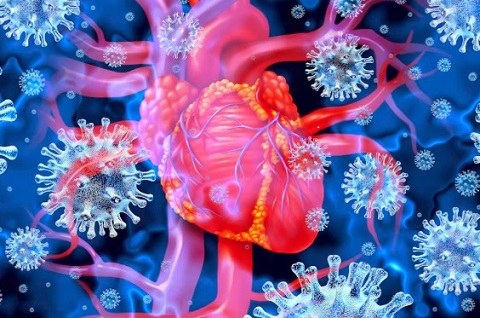Scientists Uncover Immune Clues and Blood Markers Behind COVID-19 Heart Inflammation
Nikhil Prasad Fact checked by:Thailand Medical News Team Apr 09, 2025 3 days, 17 hours, 49 minutes ago
Medical News: In a groundbreaking study, Chinese researchers from the Ningbo Institute of Innovation for Combined Medicine and Engineering and Ningbo Medical Center Lihuili Hospital at Ningbo University, along with experts from Xi’an Jiaotong University and its associated health and genetics laboratories in China, have shed new light on the elusive nature of COVID-19-induced myocarditis. Using advanced bioinformatics tools, the team has identified two key biomarkers and several immune cell patterns that could revolutionize how we detect and treat heart inflammation caused by the SARS-CoV-2 virus.
 Scientists Uncover Immune Clues and Blood Markers Behind COVID-19 Heart Inflammation
Scientists Uncover Immune Clues and Blood Markers Behind COVID-19 Heart Inflammation
Myocarditis, an inflammation of the heart muscle, has long been linked to viral infections. However, the version associated with COVID-19 has proven particularly difficult to diagnose due to overlapping symptoms with other viral infections and limited access to heart tissue biopsies during the pandemic. This
Medical News report explores a recent study that aims to bridge that diagnostic gap by using powerful gene analysis techniques and machine learning algorithms.
How the Study Was Done
Researchers obtained gene expression data from mouse models of viral myocarditis and validated their findings using actual human heart cells exposed to SARS-CoV-2. They employed two sophisticated machine learning tools - LASSO regression and support vector machine recursive feature elimination (SVM-RFE) - to screen hundreds of genes and identify those most relevant to viral-induced heart inflammation.
Out of an initial pool of 30 differentially expressed genes (DEGs), the team narrowed down to just four standout candidates: B2M, C3, CFB, and CASP12. However, only B2M and C3 showed significant changes in human cardiac pericytes infected with the virus and were strongly associated with immune responses.
What the Biomarkers Reveal
B2M (beta-2-microglobulin) and C3 (complement component 3) emerged as the most promising diagnostic markers. The presence and activity levels of these molecules in heart cells were highly predictive of COVID-19 myocarditis, with B2M showing an exceptional area under the curve (AUC) value of 0.978 and C3 closely behind at 0.956 - near-perfect scores in diagnostic testing.
Further analysis revealed that B2M expression correlated with increased levels of activated natural killer (NK) cells and dendritic cells - both known for their roles in antiviral defense and inflammation. Meanwhile, C3 was linked to resting memory CD4 T cells but inversely associated with activated dendritic cells and eosinophils, suggesting a more complex role in immune regulation.
The Immune Cell Landscape in COVID Myocarditis
Using the CIBERSORT algorithm, the scientists also investigated how the immune system behaves during COVID-related heart inflammation. They found that samples infected with SARS-CoV-2 had significantly higher levels of M1 macrophages, activated NK cells, and dendritic cells - a
ll key players in initiating inflammation. On the other hand, neutrophil levels were notably lower.
These findings suggest that the immune system in COVID myocarditis becomes hyperactive in some areas while subdued in others, creating an imbalance that may contribute to heart tissue damage.
Why It Matters
This study is one of the first to combine large-scale gene expression analysis, immune cell profiling, and real patient data to unravel the biology of COVID-19 myocarditis. The discovery of B2M and C3 as reliable diagnostic indicators opens the door to developing blood-based tests for early detection, while the immune cell patterns offer potential targets for immunotherapy.
Conclusion
The implications of this study are far-reaching. By identifying B2M and C3 as potent biomarkers and mapping out the immune cell signatures involved in COVID-19-induced myocarditis, researchers have taken a major step forward in diagnosing and potentially treating this dangerous complication. The findings emphasize how COVID-19 can trigger a chaotic immune reaction that affects the heart, and understanding these responses could lead to more precise and life-saving therapies in the near future. Given the current limitations in clinical diagnostics, these new tools and insights offer a vital pathway toward better care and outcomes for patients experiencing cardiac complications from COVID-19.
The study findings were published in the peer reviewed journal: Cardiology Research and Practice
https://onlinelibrary.wiley.com/doi/10.1155/crp/2349610
For the latest COVID-19 News, keep on logging to Thailand
Medical News.
Read Also:
https://www.thailandmedical.news/news/the-immune-system-s-role-in-myocarditis-unraveling-complex-pathways-for-better-therapies
https://www.thailandmedical.news/news/viruses-including-sars-cov-2-silently-attack-heart-communication-proteins-leading-to-deadly-arrhythmias-and-myocarditis
https://www.thailandmedical.news/news/astragalus-injection-offers-hope-for-treating-viral-myocarditis
https://www.thailandmedical.news/pages/thailand_doctors_listings
https://www.thailandmedical.news/articles/hospital-news
